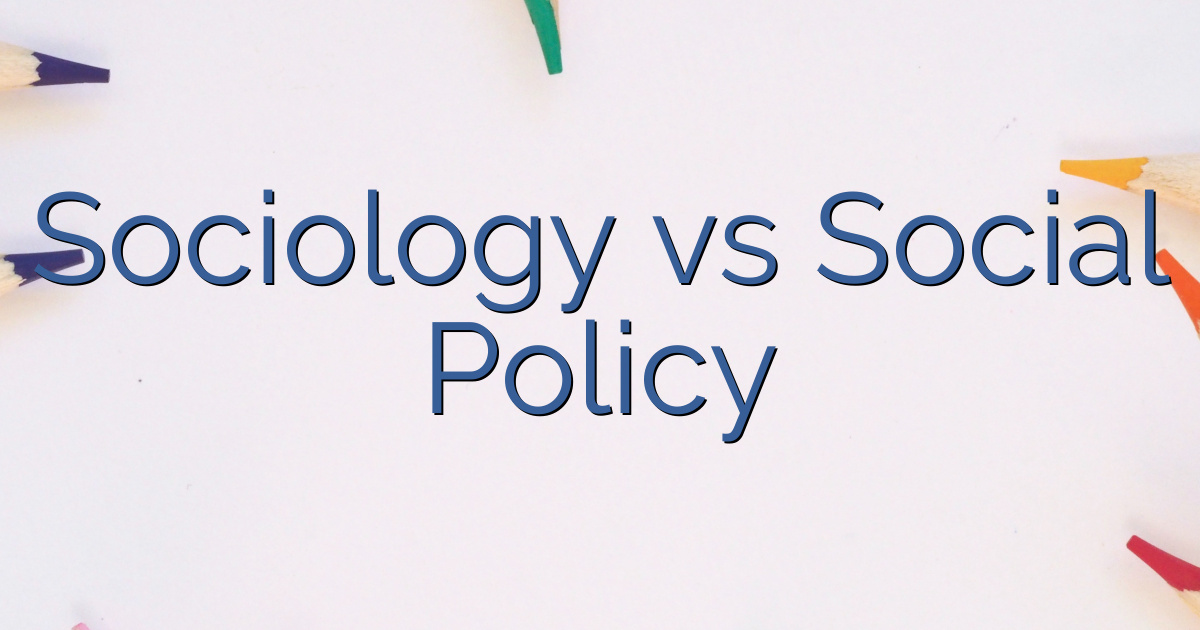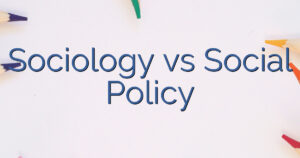 Are you trying to decide between majoring in Sociology or Social Policy? Understanding the differences and similarities between these two disciplines is crucial.
Let’s take a closer look at these majors and compare them in terms of coursework, career opportunities, and salary potential.
By examining real-life examples and analyzing the evidence, we can help you make an informed decision that aligns with your interests and goals.
So, let’s dive in and explore the world of Sociology vs. Social Policy.
Are you trying to decide between majoring in Sociology or Social Policy? Understanding the differences and similarities between these two disciplines is crucial.
Let’s take a closer look at these majors and compare them in terms of coursework, career opportunities, and salary potential.
By examining real-life examples and analyzing the evidence, we can help you make an informed decision that aligns with your interests and goals.
So, let’s dive in and explore the world of Sociology vs. Social Policy.
Table of Contents
Key Takeaways – Sociology vs Social Policy
- Sociology and social policy are two distinct majors that offer different career opportunities in fields such as social research, human resources, and community development.
- Both majors focus on understanding social issues and contribute to creating a more equitable and just society.
- The curriculum and requirements for sociology and social policy majors differ, with sociology focusing on empirical research and social policy examining the impact of policies on societal structures and institutions.
- Both majors develop transferable skills such as critical thinking, research, analytical, communication, problem-solving, and data interpretation skills, which are valuable in various career paths.
Overview of the two majors: Sociology and Social Policy
If you’re trying to decide between sociology and social policy, it’s important to understand the differences and similarities between these two majors. In terms of job prospects, sociology offers a wide range of opportunities. Graduates can work in fields such as social research, human resources, and community development. On the other hand, social policy focuses on analyzing and developing policies that address social issues. This major can lead to careers in government, non-profit organizations, and think tanks. Both sociology and social policy have a significant impact on society. Sociology helps us understand social structures, inequalities, and patterns, which can inform policies and interventions aimed at improving social well-being. Social policy, on the other hand, directly addresses social problems by designing and implementing policies that aim to create positive change in areas such as healthcare, education, and welfare. Overall, both majors offer rewarding career paths that contribute to creating a more equitable and just society.Overview of the curriculum and requirements of the two majors
Take a look at the curriculum and requirements of the two majors, so you can have a clear understanding of what’s expected of you. In sociology, the focus is on understanding and analyzing social phenomena and human behavior through empirical research. Research methods in sociology include surveys, interviews, observations, and statistical analysis. On the other hand, social policy examines the impact of policies on societal structures and institutions. The research methods in social policy are often interdisciplinary, drawing from sociology, economics, and political science. This allows for a more comprehensive analysis of the effects of social policies on individuals, communities, and society as a whole. The curriculum in both majors will provide you with the necessary skills to critically analyze social issues and contribute to the development of effective policies.Overview of coursework and assessments: Key components
The coursework and assessments for both sociology and social policy majors include a variety of assignments and exams to evaluate your understanding and application of key concepts. Assessments types may include essays, research papers, group projects, presentations, and exams. Grading criteria typically involve evaluating your ability to analyze social issues, apply theoretical frameworks, conduct research, and communicate your ideas effectively. Here is an overview of the coursework and assessments for sociology and social policy majors:| Sociology Major | Social Policy Major |
|---|---|
| Sociological Theory | Policy Analysis and Evaluation |
| Social Research Methods | Social Policy and Inequality |
| Gender and Society | Policy Implementation and Evaluation |
| Race and Ethnicity | Comparative Social Policy |
Comparison of Transferable Skills Developed
Developing critical thinking and analytical skills is a key focus of both sociology and social policy coursework. These skills are highly valuable and transferable to a wide range of professions, enhancing job prospects for graduates. Here are some of the transferable skills that students can develop through studying sociology and social policy:- Research skills: Students learn how to gather and analyze data, which is crucial in many professional fields.
- Communication skills: Sociology and social policy coursework involves writing essays, giving presentations, and engaging in group discussions, all of which improve communication abilities.
- Problem-solving skills: Studying these subjects equips students with the ability to think critically and propose solutions to complex problems.
- Empathy and understanding: Through studying sociology and social policy, students develop a deeper understanding of different social issues and develop empathy towards diverse populations.
- Data interpretation: Students learn how to interpret and analyze social data, an essential skill in today’s data-driven world.
Comparison of Career Opportunities and Job Roles in Sociology Vs. Social Policy: Research
You can enhance your research skills and contribute to solving complex problems in various career opportunities in sociology and social policy. Both fields offer promising career prospects and research opportunities for individuals interested in studying society and its policies. In sociology, you can work as a sociologist, conducting research on various social issues such as inequality, discrimination, and crime. You can also work as a social policy analyst, examining the impact of policies on society and suggesting ways to improve them. Similarly, in social policy, you can work as a policy researcher, analyzing the effectiveness of social programs and making recommendations for policy changes. Additionally, you can work as a research associate, assisting in data collection and analysis. These career paths provide ample opportunities for conducting research and making a positive impact on society.Comparison of Salary Potential: Job Market Outlook
To better understand the salary potential and job market outlook, consider exploring the career opportunities and growth in both sociology and social policy. When it comes to job market trends, both fields offer promising prospects. In sociology, the demand for professionals who can analyze social issues and trends is on the rise. With a focus on research and data analysis, sociologists can find employment in various sectors such as government, non-profit organizations, and academia. On the other hand, social policy professionals play a crucial role in shaping social programs and policies. Their expertise is sought after by government agencies, think tanks, and advocacy organizations. While salary potential can vary based on factors like education, experience, and location, both sociology and social policy offer competitive earning potential. It’s worth noting that advanced degrees and specialized skills can enhance job prospects and earnings in these fields.Similarities between the two majors: Curriculum and Requirements
Consider exploring the similarities in curriculum and requirements between these two majors. While sociology and social policy may have distinct focuses, they share commonalities in terms of research methodologies, data analysis techniques, theoretical frameworks, and concepts used. In terms of research methodologies and data analysis techniques, both sociology and social policy rely heavily on qualitative and quantitative research methods. They employ surveys, interviews, observations, and statistical analysis to gather and analyze data. Theoretical frameworks and concepts used in both majors also overlap. Both disciplines draw upon theories such as structural functionalism, conflict theory, and symbolic interactionism to understand social phenomena. They explore concepts like social inequality, socialization, and power dynamics to examine societal issues. Overall, while sociology and social policy may differ in their specific focuses, their shared approach to research and theoretical foundations provide a solid foundation for students pursuing either major.Difference between Sociology and Social Policy: Specializations
Now that we have explored the similarities between Sociology and Social Policy in terms of their curriculum and requirements, let’s delve into the differences between these two majors. One significant difference lies in their specializations. While Sociology focuses on understanding social behavior and the underlying social structures, Social Policy places a greater emphasis on the analysis and implementation of social welfare programs. Sociology, as a field, employs sociological analysis to examine and explain various social phenomena, such as inequality, social movements, and cultural norms. On the other hand, Social Policy takes a more applied approach by developing and evaluating policies that aim to address societal issues, such as poverty, healthcare, and education. Social Policy practitioners often work directly with government agencies, nonprofit organizations, and community groups to design and implement social welfare programs. Understanding this difference in specialization is crucial for individuals considering these majors, as it can help inform their career paths and areas of interest within the broader field of social sciences.What are the key differences between Sociology and Social Policy?
Sociology and social work differences lie in their focus and application. Sociology examines society’s structures and dynamics, while social policy addresses how to address social issues through legislation and public programs. Sociology provides the theoretical framework, while social policy implements practical solutions to social problems.
Factors to consider when choosing between the two majors: Interests
When choosing between these two majors, think about what interests you the most within the field of social sciences. Both sociology and social policy offer unique career paths and job prospects. Here are three factors to consider:- Specializations: Sociology allows you to explore a wide range of topics such as gender studies, criminology, and social inequality. On the other hand, social policy focuses more on analyzing and implementing policies aimed at addressing social issues like poverty and healthcare.
- Research vs. Implementation: Sociology emphasizes research and analysis, providing you with the skills to conduct studies and analyze data. Social policy, on the other hand, focuses on policy implementation and evaluation, allowing you to make a direct impact on society.
- Job Opportunities: Sociology graduates can find employment in various sectors such as education, human resources, and social services. Social policy graduates often work in government agencies, non-profit organizations, and think tanks.

